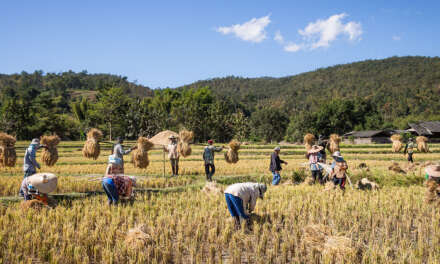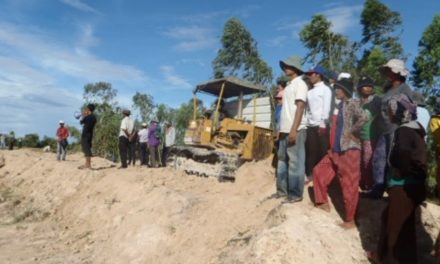09 Jan 2006 10:12:27 GMT
Source: Reuters
Sukree Sukplang
CHIANG MAI, Thailand, Jan 9 (Reuters) – Thousands of Thais marched through the northern city of Chiang Mai on Monday to protest against a U.S.-Thai free-trade pact as officials began a sixth round of negotiations.
The protesters, including farmers from the drought-plagued northeast and HIV/AIDS patients in Bangkok, marched 2 km (1 mile) from the city’s main train station to the U.S. consulate chanting and waving placards.
"We want the whole negotiation process to end because they are not transparent and against the constitution," said Kannikar Kittivechakul of the People’s Network Against Free Trade Agreements and Privatisations, which organised the rally.
The group said a free-trade pact would result in the privatisation of public utilities under U.S. management and farmers would suffer from cheap farm imports while paying more for U.S.-made drugs.
The United States is Thailand’s largest trade partner. Thai exports were worth $15 billion in 2004 and imports $7.2 billion.
Neena Moorjani, spokeswoman for the U.S. trade delegation, called the protests "a sign of healthy democracy".
Trade negotiators resumed talks on Monday. A Thai negotiator said last week services and financial sectors, left aside in early rounds, would be on the table during the week-long meeting.
Pharmaceuticals, another delicate issue, were also likely to be discussed despite opposition from groups that fear Thailand’s generic drug industry would be hurt, Thai chief negotiator Nitya Pibulsonggram said.
William Aldis, the World Health Organisation representative in Bangkok, said Thailand should think carefully about surrendering access to cheap medicine in exchange for a free-trade deal.
"The stakes are indeed high, especially for the 600,000 Thais living with HIV/AIDS and whose survival will depend on the availability of affordable anti-retroviral drugs," Aldis wrote in the Bangkok Post newspaper.
Moorjani said the U.S. delegation hoped a final deal could be wrapped up in a few months.
"Specifically, we hope to make sufficient progress on the text of the chapters under negotiation as well as market access," she said in a statement to Reuters. (Additional reporting and writing by Nopporn Wong-Anan in Bangkok)
REUTERS/SUKREE SUKPLANG
……………….
AFX News Limited
Thousands stage protest rally in Thailand as free trade talks with US resume 01.09.2006, 03:40 AM
CHIANG MAI, Thailand (AFX) – Thousands of Thais took to the streets today to protest the latest free-trade talks with the US, claiming the deal will hurt farmers and reduce access to life-saving drugs.
The demonstration came as the two countries began their sixth round of talks, expected to last until Friday, since they launched negotiations in June 2004.
Neena Moorjani, spokeswoman for the US Trade Representative, said negotiators in Chiang Mai are fleshing out the language of the deal.
‘We are meeting to talk about how we make sufficient progress to make sure we finish by the spring,’ she said.
Negotiators are still hammering out differences over sensitive issues such as agriculture, drug patents and the liberalization of Thailand’s financial sectors, according to Thai officials.
The noisy but peaceful group of farmers, AIDS activists, consumer advocates and other protesters marched to the US consulate general in the northwestern city of Chiang Mai. Organizers said around 10,000 demonstrators were on hand.
Witoon Liamchamroon, who coordinated the protest for an umbrella group of activists called Free Trade Watch, said the talks were at a critical stage.
‘The FTA (free-trade agreement) with the United States is not fair for Thai people. Only the United States will get benefits out of this deal,’ said Witoon.
The group, which was formed in 2003 by activists, academics and non-governmental organizations, has been campaigning for greater public involvement in Thailand’s free-trade agreements.
For Thailand, key issues include Washington’s proposal to enforce 25-year patent protection for US-made pharmaceutical drugs, which is tougher than World Trade Organization rules that offer only 20 years.
Witoon said the US proposal will effectively restrict public access to cheap generic drugs in Thailand, which has one of Asia’s highest rates of HIV infection with 670,000 HIV or AIDS patients or one percent of the population.
‘The United States is pressuring Thailand to agree on the drug patent issue. The extension of patent protection for US drugs could force Thai AIDS patients to pay for drugs at higher prices,’ he said.
Witoon also argued that Washington’s call for further opening of the Thai agricultural market is unfair, saying the FTA could put a large number of Thai farmers out of business in the face of cut-throat global competition.









